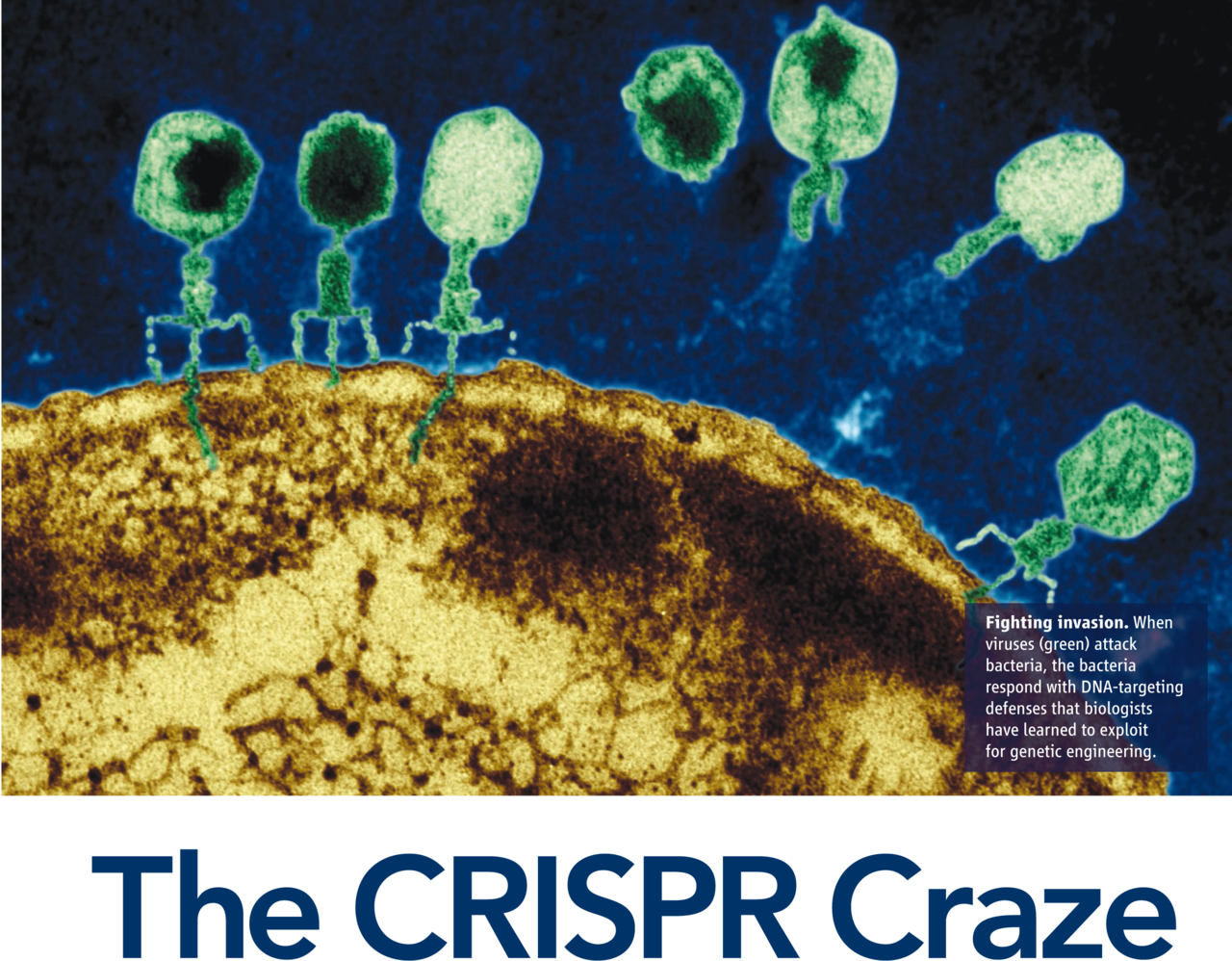Research
To defend themselves against invaders prokaryotes have developed a plethora of defence strategies. One of them is the prokaryotic immune system CRISPR-Cas. This system is present in almost all archaea and about half of the bacteria. Analysis of the CRISPR-Cas systems in different organisms has revealed a multitude of different versions of this system that have been classified into three major types and many subtypes. Data reported about the few subtypes analysed so far clearly confirm the differences between the subtype-systems and the necessity to study all subtypes in detail. In the last years the research on the prokaryotic immune system has exploded: The discovery that the type II CRISPR-Cas system can be employed for manipulating eukaryotic genomes has added to the "CRISPR Craze".

The "CRISPR-Craze". The journal Science created 2013 the term "CRISPR Craze" for the sudden increase in publications and applications of the CRISPR-Cas system (Figure from: Pennisi, E. (2013) Science 341, 833-836. doi: 810.1126/science.1341.6148.1833.).
Despite this major increase of publications on CRISPR-Cas many details of the mechanism are still missing. Furthermore, whereas few subtypes like the E. coli I-E have been studied in detail, almost nothing is known about most of the other subtypes (e.g. type I-D).
The goal of the concerted projects in the Forschergruppe is to unravel the prokaryotic immune system CRISPR-Cas in Bacteria and Archaea. The CRISPR-Cas system in prokaryotes has some conserved features but seems to be also highly variable. The CRISPR spacer and repeat sequences have different sequences and lengths. The Cas proteins belong to approximately 45 different protein families. For most of these proteins the functional assignment is missing. Moreover, bioinformatics analyses suggest the presence of certain protein components in cyanobacteria and some chloroflexi, which otherwise occur exclusively in Archaea. Despite the progress made in understanding CRISPR function, many questions regarding the structure and function of its key components remain to be answered.
Several reviews are available for further reading, some of which we are listing here below:
R. Barrangou, L.A. Marraffini, CRISPR-Cas systems: Prokaryotes upgrade to adaptive immunity, Mol Cell., 54 (2014) 234-244. doi: 210.1016/j.molcel.2014.1003.1011.
L.K. Maier, B. Stoll, J. Brendel, S. Fischer, F. Pfeiffer, M. Dyall-Smith, A. Marchfelder, The ring of confidence: a haloarchaeal CRISPR/Cas system, Biochem Soc Trans., 41 (2013) 374-378. doi: 310.1042/BST20120263.
K.S. Makarova, D.H. Haft, R. Barrangou, S.J. Brouns, E. Charpentier, P. Horvath, S. Moineau, F.J. Mojica, Y.I. Wolf, A.F. Yakunin, J. van der Oost, E.V. Koonin, Evolution and classification of the CRISPR-Cas systems, Nature Reviews Microbiology, 9 (2011) 467-477. Epub 2011 May 2019.
J. Reeks, J.H. Naismith, M.F. White, CRISPR interference: a structural perspective, Biochem J., 453 (2013) 155-166. doi: 110.1042/BJ20130316.
R. Sorek, C.M. Lawrence, B. Wiedenheft, CRISPR-mediated adaptive immune systems in bacteria and archaea, Annu Rev Biochem., 82:237-66. (2013) 10.1146/annurev-biochem-072911-172315. Epub 072013 Mar 072911.
J. van der Oost, E.R. Westra, R.N. Jackson, B. Wiedenheft, Unravelling the structural and mechanistic basis of CRISPR-Cas systems, Nat Rev Microbiol., 12 (2014) 479-492. doi: 410.1038/nrmicro3279. Epub 2014 Jun 1039.
G. Vestergaard, R.A. Garrett, S.A. Shah, CRISPR adaptive immune systems of Archaea, RNA Biol., 11 (2014) 156-167. doi: 110.4161/rna.27990. Epub 22014 Feb 27997.
E.R. Westra, A. Buckling, P.C. Fineran, CRISPR-Cas systems: beyond adaptive immunity, Nat Rev Microbiol., 12 (2014) 317-326. doi: 310.1038/nrmicro3241. Epub 2014 Apr 1037.
E.R. Westra, D.C. Swarts, R.H. Staals, M.M. Jore, S.J. Brouns, J. van der Oost, The CRISPRs, They Are A-Changin': How Prokaryotes Generate Adaptive Immunity, Annu Rev Genet., 46:311-39. (2012) 10.1146/annurev-genet-110711-155447.
Contact
Coordinator:
Prof. Dr. Anita Marchfelder
Biology II
Ulm University
89069 Ulm
Phone: +49 - 731-50-22658
Fax: +49 - 731-50-12-22658
anita.marchfelder(at)uni-ulm.de
Secretary:
Annemarie Windeck
Phone: +49 - 731-50-23931
Fax: +49 - 731-50-23932
annemarie.windeck(at)uni-ulm.de
